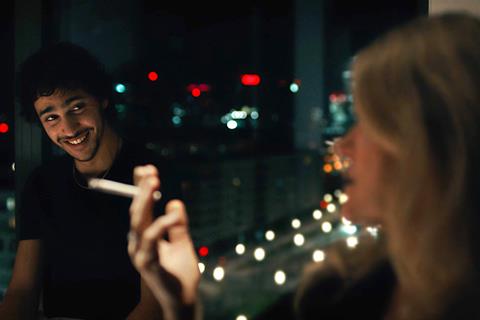Barbara Sukowa and Lambert Wilson head this multi-layered story of the fallout from the arrival of a naive Moroccan immigrant in Berlin

Dir/scr: Angelina Maccarone. Germany. 2024. 124mins
Turning Tables supplies a rangy, nuanced view of the impact of a young Moroccan immigrant on three middle-class Europeans and, in doing so, offers an essential counterpoint to the black-and-white emotional reactions that this hot-button issue often provokes. Carefully balanced and thoughtful to the point of chilliness, the film’s execution is sometimes outmatched by its ambition as it struggles to pack in all that it wants to say. But Angelina Maccarone’s (Hounded, Vivere) low-key, unsensational approach and sly subversion of viewer expectations more than make up for its flaws. Politically themed festivals and sidebars should take notice.
An essential counterpoint to the black-and-white emotional reactions that this hot-button issue often provokes
Turning Tables – whose its German title, Klandestin, is far more evocative and on-point – opens with a remarkable long-distance shot of the Frankfurt skyline, which is then disturbed by the sound of an explosion. It is the effects of this explosion on the protagonists that the film will go on to explore, moving back and forth in time as it tackles each of them by turn.
Immigration drags people from different orbits into sometimes dangerous proximity, and it is in this danger zone that the film plays out. Hoping to make a new life in Berlin, Malik (Habib Adda) has been smuggled across the German border in a van belonging to Richard (Lambert Wilson), an aging painter who, like many before him, is hopelessly infatuated with the younger Moroccan. Richard is an old friend of Mathilda (Barbara Sukowa), a steely right-wing politico with strongly anti-immigration views. Yet, Malik ends up staying at Mathilda’s apartment – she even offers to help him get a visa – while Richard travels to London.
Mathilda’s PA, lawyer Amina (Banafshe Hourmazdi), is a second-generation immigrant who has made a good life in Germany. A single mother, she is also trying to escape from a relationship with Sibylle (Katharina Schuttler), a political opponent of Mathilda’s. Having been strictly forbidden from doing so, Malik leaves Mathilda’s apartment and promptly becomes buddies with the two roller-skating anarchists who laid the bomb. Frankfurt’s seemingly ubiquitous surveillance cameras will do the rest.
That’s a lot of socio-political and emotional material, and indeed there’s enough bubbling away beneath the surface here for a mini-series. There’s always the nagging sense of material being compressed: a couple of coincidences have to be forced in order to push through the story that Maccarone wants to tell, but the script handles them in a broadly successful manner. The leaps across time periods, as we learn how each of the characters came to be here, are smooth-flowing and confusion-free. On the downside, Maccarone’s admirable wish to avoid histrionics ironically leaves the film feeling stylistically a little flat, with a couple of clear opportunities missed to raise the emotional temperature
The dramatic compression is more damaging at the level of character, with the women coming over as living, breathing people but the men struggling against stereotype. Tousled-haired and ever upbeat, Malik presumably has an inner life, but the script limits it to a couple of flashbacks. As the aging artist desperately seeking to reclaim his youth via his relationship with Malik, Richard fares even worse, his emotional turmoil starting to feel self-indulgent in a setting where the stakes for everyone else are so high.
It’s through the women that the real issues of Turning Tables are played out, as Mathilda and Amina struggle to negotiate a hidden, klandestin side to themselves that Malik’s arrival has brought into the open. In public, Mathilda is a nasty piece of work – cynically happy to conform to the Iron Lady stereotype, she thoughtlessly delivers anti-Muslim soundbites to keep her followers onside. But as she reminds Richard, things aren’t so black and white; she has a history and has been a different kind of person, and it’s presumably the previous, more idealistic version of her that brings Malik, albeit implausibly, into her apartment.
Mathilda offering Amina a job as her PA is a self-serving strategy, since employing a Moroccan would “play well”. But through the drama Amina herself, embodying themes of race, identity and sexuality previously tackled by Maccarone in 2005’s Unveiled, starts to question whether she’s done the right thing in following her mother’s advice by trying to “be German”, which she comes to feel as a betrayal of her own identity. It is in the character of Amina that Turning Tables is at its most thoughtful.
Production companies: Cala Film
International sales: Kunsthochschule für Medien Köln, Uta Dilger ute.dilger@khm.de.
Producers: Martina Haubrich, Claudia Schroter
Cinematography: Florian Foest
Production design: Holger Sebastian Muller
Editing: Gergana Voigt
Music: Freya Arde
Main cast: Habib Adda, Banafshe Hourmazdi, Barbara Sukowa, Lambert Wilson, Katharina Schuttler















![[L-R]: Amanda Villavieja, Laia Casanovas, Yasmina Praderas](https://d1nslcd7m2225b.cloudfront.net/Pictures/274x183/6/4/1/1471641_pxl_20251224_103354743_618426_crop.jpg)








